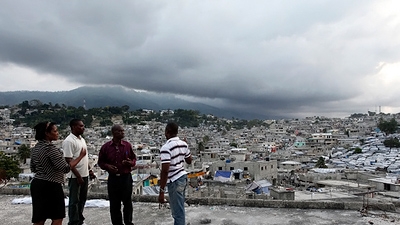In terms of shifting demographics, 2010 was a pivotal year for Haiti. After the earthquake, the urban population exploded, especially in Port-au-Prince, particularly with the urban sprawl created by the 1.5 million displaced persons. The biggest challenge was relocating residents to very limited rental stock and space, which was compounded by another factor—providing the State with central authorities to handle accommodation, urban policy, and housing, as well as seismic building codes.
Four years later, major results have been achieved—90 percent of displaced persons have been relocated, many of them through innovative solutions involving assistance with the rental and construction of multifamily homes, an effort led by the Unit for Housing and Public Building Construction. The first National Housing and Habitat Policy drafted by this institution won the backing of the Government in October 2013.
A new national building code and guidelines for constructing safe and sturdy hospitals were published by the Technical Building Assessment Office of the Ministry of Public Works, Transport, and Communication. Neighborhoods have been spruced up.
One of the major projects still underway is the formulation of an urban policy to accompany urban growth in cities where facilities and planning are often deficient and virtually no consideration is given to climate and environmental risk management. Individuals often take the place of the State, managing their living spaces and having little or no basic services.
“There is an urgent need to formulate a joint project for the metropolitan region so that we do not simply have areas that are close to each other with residents living in separate enclaves (pockets of poverty, rural lifestyles transferred to the city, and the affluent living in gated communities)” explains Michèle Oriol, a sociologist and Executive Secretary of the Interministerial Committee for Territorial Planning (CIAT).
Last week, CIAT therefore organized the First National Urban Forum to hold general discussions on the topic “Building the City,” with an agenda that included workshops, conferences, and urban site visits.

